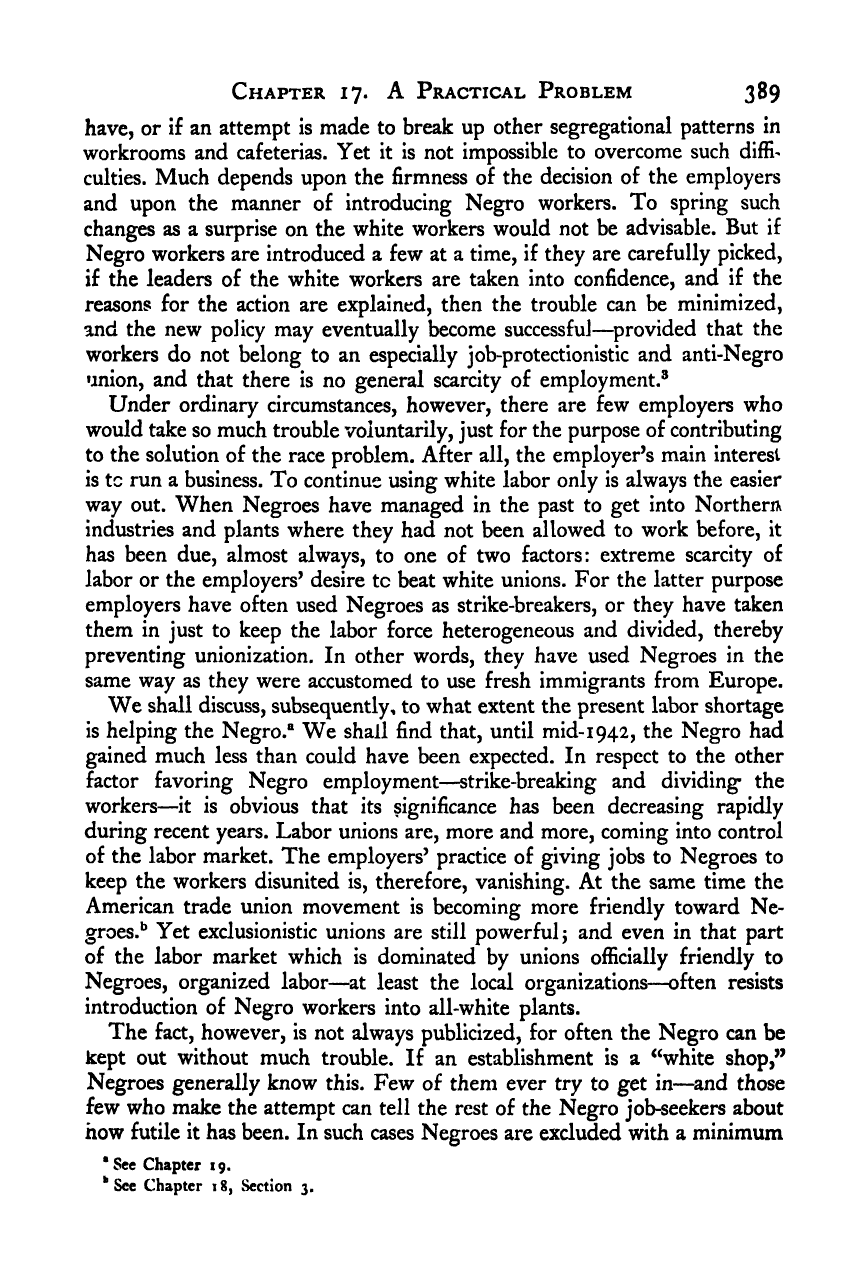Note: Gunnar Myrdal died in 1987, less than 70 years ago. Therefore, this work is protected by copyright, restricting your legal rights to reproduce it. However, you are welcome to view it on screen, as you do now. Read more about copyright.
Full resolution (TIFF) - On this page / på denna sida - IV. Economics - 17. The Mechanics of Economic Discrimination as a Practical Problem - 4. The Regular Industrial Labor Market in the North

<< prev. page << föreg. sida << >> nästa sida >> next page >>
Below is the raw OCR text
from the above scanned image.
Do you see an error? Proofread the page now!
Här nedan syns maskintolkade texten från faksimilbilden ovan.
Ser du något fel? Korrekturläs sidan nu!
This page has never been proofread. / Denna sida har aldrig korrekturlästs.
Chapter 17. A Practical Problem 389
have, or if an attempt is made to break up other segregational patterns in
workrooms and cafeterias. Yet it is not impossible to overcome such diffi-
culties. Much depends upon the firmness of the decision of the employers
and upon the manner of introducing Negro workers. To spring such
changes as a surprise on the white workers would not be advisable. But if
Negro workers are introduced a few at a time, if they are carefully picked,
if the leaders of the white workers are taken into confidence, and if the
reasons for the action are explained, then the trouble can be minimized,
and the new policy may eventually become successful—provided that the
workers do not belong to an especially job-protectlonistic and anti-Negro
union, and that there is no general scarcity of employment.®
Under ordinary circumstances, however, there are few employers who
would take so much trouble voluntarily, just for the purpose of contributing
to the solution of the race problem. After all, the employer’s main interest
is tc run a business. To continue using white labor only is always the easier
way out. When Negroes have managed in the past to get into Northern
industries and plants where they had not been allowed to work before, it
has been due, almost always, to one of two factors: extreme scarcity of
labor or the employers’ desire tc beat white unions. For the latter purpose
employers have often used Negroes as strike-breakers, or they have taken
them in just to keep the labor force heterogeneous and divided, thereby
preventing unionization. In other words, they have used Negroes in the
same way as they were accustomed to use fresh immigrants from Europe.
We shall discuss, subsequently, to what extent the present labor shortage
is helping the Negro.® We shall find that, until mid-1942, the Negro had
gained much less than could have been expected. In respect to the other
factor favoring Negro employment—strike-breaking and dividing- the
workers—it is obvious that its significance has been decreasing rapidly
during recent years. Labor unions are, more and more, coming into control
of the labor market. The employers’ practice of giving jobs to Negroes to
keep the workers disunited is, therefore, vanishing. At the same time the
American trade union movement is becoming more friendly toward Ne-
groes.** Yet exclusionistic unions are still powerful j
and even in that part
of the labor market which is dominated by unions officially friendly to
Negroes, organized labor—at least the local organizations—often resists
introduction of Negro workers into all-white plants.
The fact, however, is not always publicized, for often the Negro can be
kept out without much trouble. If an establishment is a ^^white shop,”
Negroes generally know this. Few of them ever try to get in—^and those
few who make the attempt can tell the rest of the Negro job-seekers about
how futile it has been. In such cases Negroes are excluded with a minimum
* See Chapter 19.
**
Sec Chapter 18, Section 3,
<< prev. page << föreg. sida << >> nästa sida >> next page >>